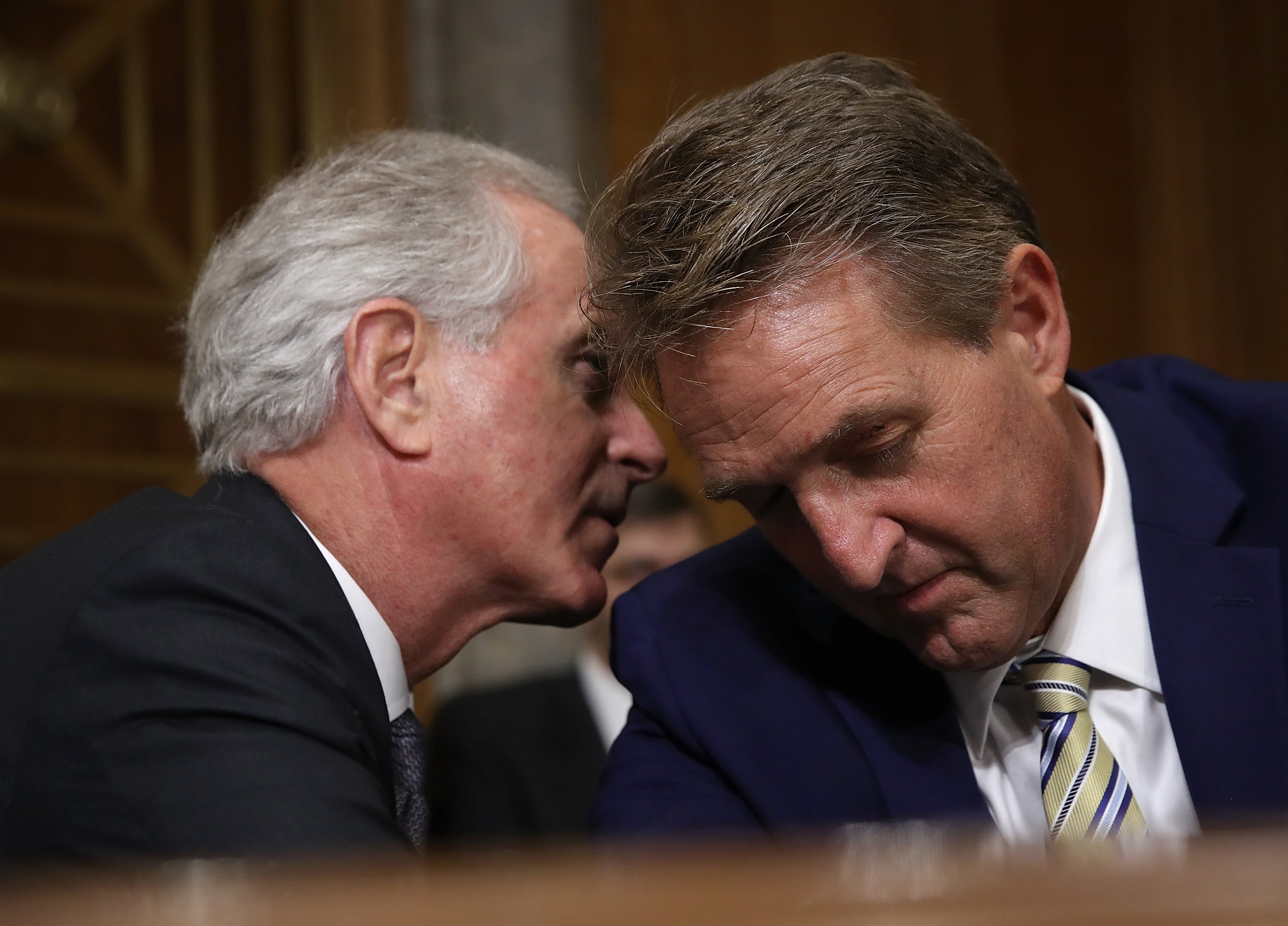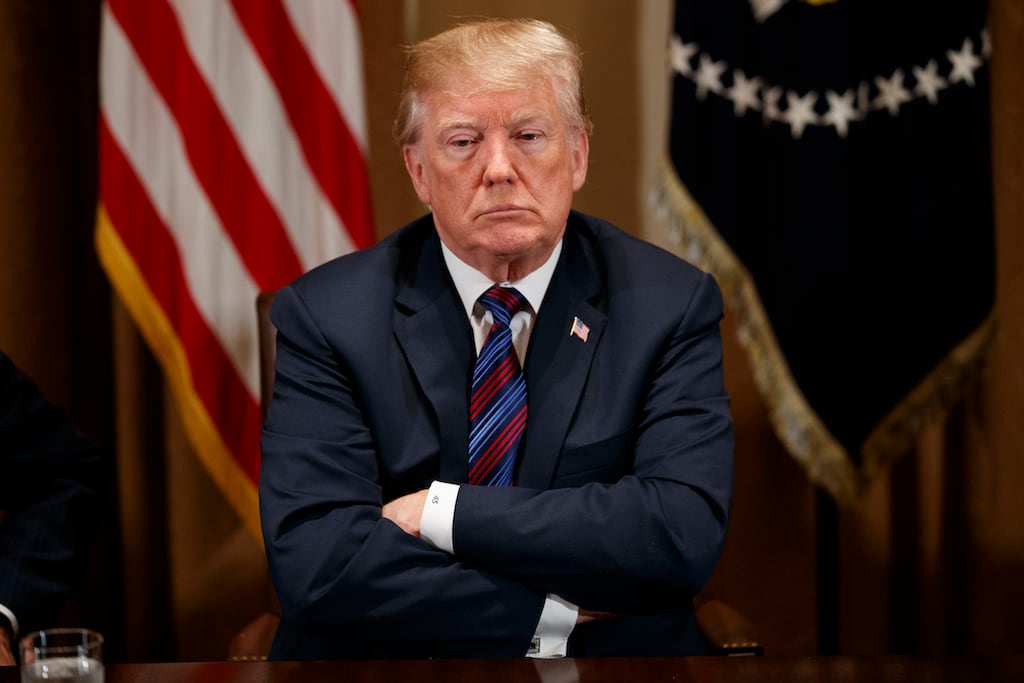WASHINGTON — President Donald Trump would get broad authority to use force against terrorist groups, with no expiration date, under a new bipartisan proposal unveiled in the U.S. Senate on Monday.
The proposed bill would cover all terrorist groups the U.S. is currently fighting, and it would not restrict the president from taking immediate action against enemies in other global hot spots.
The new proposal, which advances a congressional debate about America’s ongoing conflicts around the world and the 17-year-old war on terrorism, comes as Congress is asking questions about President Donald Trump’s strike on Syria last week.
The new resolution would not necessarily provide congressional authorization for the airstrikes Trump ordered, with coalition forces, in response to an alleged chemical weapons attack against civilians in the Damascus suburb of Douma.
The war authorization negotiated by Sens. Bob Corker, R-Tenn., and Tim Kaine, D-Va., was released Monday. Its co-sponsors include Sens. Chris Coons, D-Del.; Jeff Flake, R-Ariz.; Bill Nelson, D-Fla., and Todd Young, R-Ind.
RELATED

Corker said he is focused on the committee’s markup, set for Monday and not the murky politics of its passage in Congress. Corker acknowledged he has no commitment from Senate GOP leaders the bill will advance to a floor vote and a path to passage in the House is unclear.
“It is a political season, everybody says they want to weigh in on a new AUMF, we’ll see if they really want to weigh in on a new AUMF,” Corker said, using the acronym for authorization of the use of military force.
The proposed authorization would not expire on a specific date — which some Democratic lawmakers would prefer. It would instead include a process for lawmakers to review the previous authorization and vote to repeal or modify it. Congressional inaction would allow the previous authorization to remain.
An added oversight measure would require the president to notify Congress within 48 hours if and when military operations are expanded into countries beyond Afghanistan, Iraq, Syria, Somalia, Yemen and Libya, or against “new designated associated forces.”
Such a notification would kick off a two-month review period by Congress during which legislation to block the expanded strikes would qualify for expedited consideration.
RELATED

This is the latest attempt to replace the war authorizations Congress passed in the wake of the Sept. 11, 2001, attacks, which have since been stretched to include conflicts far beyond Iraq and Afghanistan, where Congress initially gave President George W. Bush authority to deploy troops.
Congressional reaction to the Syria strikes have been mixed, but there has been support across partisan lines. However, Senate Armed Services Chairman John McCain, R-Ariz., and other lawmakers of both parties have called on the administration to present its strategy for the complex conflict.
Kaine was among mostly Democratic critics of the Trump administration’s Syria airstrikes, calling them “illegal” and “reckless” without congressional approval and absent a broader strategy.
Kaine has pressed for a war authorization ever since the Obama administration. Last year, he and Flake introduced one that would cover the Islamic State, al-Qaida and the Taliban, but expire after five years and require congressional approval if the administration wants to include new groups.
“I hope President Trump will follow the American Constitution,” the Democratic senator from Virginia said on CBS’ “Face the Nation.” “It’s very, very clear Congress has the power to declare war — and only Congress.”
Flake told Defense News that lawmakers’ uneasiness about deepening U.S. involvement in Syria could fuel support where other authorization proposals failed. Flake predicted this bill would achieve “overwhelming Republican support.”
“It certainly recognizes the authority of the president and it doesn’t restrict the use of ground troops or geography,” Flake said. “It’s deferential to the president but it still gives us a chance to weigh in.”
Republican lawmakers have, for the most part, resisted a new war authorization as limiting to the executive branch. House Speaker Paul Ryan said last week before the airstrikes, that Trump had the authority under the existing AUMF to act.
“I would hate since we have threats across the globe, especially ISIS, is to have an AUMF that ties the hands of our military behind their backs,” said Ryan, R-Wis.
Though lawmakers were reluctant to advance an AUMF while Obama was president, there’s a key difference that may move lawmakers to want more oversight now. That’s Russia’s presence in Syria and the danger of stumbling into a war.
“That’s the difference between then and now,” said Steve Bell, a former senior Senate aide now with the Bipartisan Policy Center.
Yet, significant headwinds remain. In the House, a majority of Republicans would not support a new AUMF, and Ryan is unlikely to bring one to the floor unless it is structured in a very mild way, Bell said.
In the Senate, Majority Leader Mitch McConnell, R-Ky., may opt not permit a floor vote if the bill cannot achieve a strong GOP vote.
“It would split the party further,” Bell said of the pitfalls for McConnell. “I think he’s looking ahead and saying, there’s some fights I have to have. Do I want some additional stuff? I think the answer’s ‘no’ at this point.”
Joe Gould was the senior Pentagon reporter for Defense News, covering the intersection of national security policy, politics and the defense industry. He had previously served as Congress reporter.




